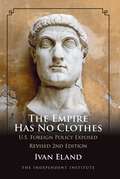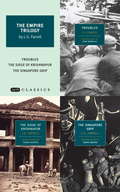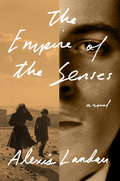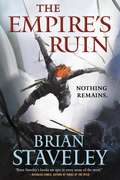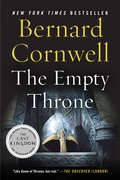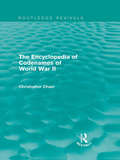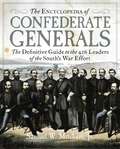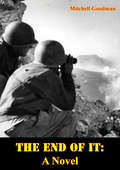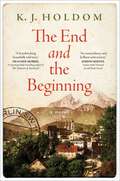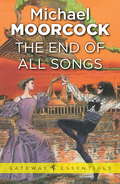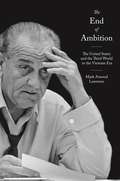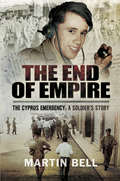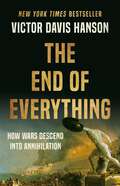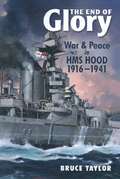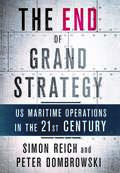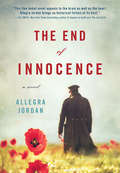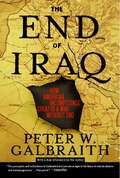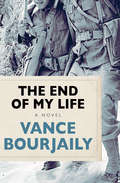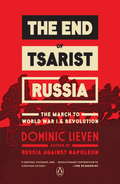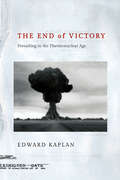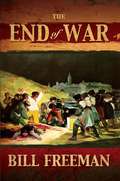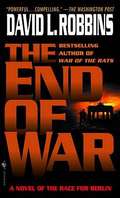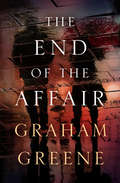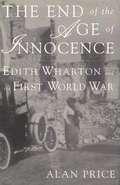- Table View
- List View
The Empire Has No Clothes: U.S. Foreign Policy Exposed
by Ivan ElandMost Americans don&’t think of their government as an empire, but in fact the United States has been steadily expanding its control of overseas territories since the turn of the twentieth century. Now, through political intimidation and over 700 military bases worldwide, the U.S. holds sway over an area that dwarfs the great empires of world history.In The Empire Has No Clothes, Ivan Eland, a leading expert on U.S. defense policy and national security, examines American military interventions around the world from the Spanish-American War to the invasion of Iraq. Eland shows that the concept of empire is wholly contrary to the principles of both liberals and conservatives and that it makes a mockery of the Founding Fathers' vision for a free republic. Eland also warns that in recent years, "blowback" and the enormous expansion of domestic federal power resulting from this overextended empire have begun to threaten the American homeland itself and curtail the very liberties these interventions were supposed to protect. Public debate of the United States' role in the world has finally begun in earnest, and Ivan Eland delivers a penetrating argument in this landmark book, exposing the imperial motives behind interventionist U.S. policy, questioning the historical assumptions on which it is based and advocating a return to the Founding Fathers' vision of military restraint overseas.
The Empire Trilogy
by J. G. FarrellThe Empire Trilogy--consisting of the Lost Booker Prize-winning Troubles, the Booker Prize-winning The Siege of Krishnapur,and The Singapore Grip--is Farrell's re-examination of the legacy, and limits, of British imperial rule. The three volumes, connected by theme rather than character, and above all by their shared wit, brio, and daring, range in setting from the India of the Great Mutiny of 1857, to Ireland immediately after the Great War, to the besieged Singapore of World War II. Together the books constitute not only a spectacular entertainment but also an ambitious refashioning of the traditional historical novel to meet the tragic realities of the modern world. · The Siege of Krishnapur - India, 1857--the year of the Great Mutiny, when Muslim soldiers turned in bloody rebellion on their British overlords. This time of convulsion is the subject of J. G. Farrell's The Siege of Krishnapur, widely considered one of the finest British novels of the last fifty years.Farrell's story is set in an isolated Victorian outpost on the subcontinent. Rumors of strife filter in from afar, and yet the members of the colonial community remain confident of their military and, above all, moral superiority. But when they find themselves under actual siege, the true character of their dominion--at once brutal, blundering, and wistful--is soon revealed. · Troubles - 1919: After surviving the Great War, Major Brendan Archer makes his way to Ireland, hoping to discover whether he is indeed betrothed to Angela Spencer, whose Anglo-Irish family owns the once-aptly-named Majestic Hotel in Kilnalough. But his fiancée is strangely altered and her family's fortunes have suffered a spectacular decline. The hotel's hundreds of rooms are disintegrating on a grand scale; its few remaining guests thrive on rumors and games of whist; herds of cats have taken over the Imperial Bar and the upper stories; bamboo shoots threaten the foundations; and piglets frolic in the squash court. Meanwhile, the Major is captivated by the beautiful and bitter Sarah Devlin. As housekeeping disasters force him from room to room, outside the order of the British Empire also totters: there is unrest in the East, and in Ireland itself the mounting violence of "the troubles." · The Singapore Grip - Singapore, 1939: life on the eve of World War II just isn't what it used to be for Walter Blackett, head of British Singapore's oldest and most powerful firm. No matter how forcefully the police break one strike, the natives go on strike somewhere else. His daughter keeps entangling herself with the most unsuitable beaus, while her intended match, the son of Blackett's partner, is an idealistic sympathizer with the League of Nations and a vegetarian. Business may be booming--what with the war in Europe, the Allies are desperate for rubber and helpless to resist Blackett's price-fixing and market manipulation--but something is wrong. No one suspects that the world of the British Empire, of fixed boundaries between classes and nations, is about to come to a terrible end.
The Empire of the Senses
by Alexis LandauA sweeping, gorgeously written debut: a novel of duty to family and country, the dictates of passion, and blood ties unraveling in the charged political climate of Berlin between the world wars. Lev Perlmutter, an assimilated, cultured German Jew, enlists to fight in World War I, leaving behind his gentile wife, Josephine, and their children, Franz and Vicki. Moving between Lev's and Josephine's points of view, the first part of the novel focuses on Lev's experiences on the Eastern Front--both in war and in love--which render his life at home a pale aftermath by comparison. The second part of the novel takes us to Berlin, 1927-28. Now young adults, the Perlmutter children grapple with their own questions: Franz, drawn into the Nazi brown shirt movement, struggles with his unexpressed homosexuality; Vicki, seduced by the Jazz Age and everything new, bobs her hair and falls in love with a young man who wants to take her to Palestine. Unlike many historical novels of its kind, The Empire of the Senses is not about the Holocaust but about the juxtaposition of events that led to it, and about why it was unimaginable to ordinary people like Lev and his wife. Plotted with meticulous precision and populated with characters who feel and dream to the fullest, it holds us rapt as the tides of cultural loss and ethnic hatred come to coexist with those of love, passion, and the power of the human spirit.From the Hardcover edition.
The Empire's Ruin (Ashes of the Unhewn Throne #1)
by Brian StaveleyBrian Staveley, author of The Emperor's Blades, gives readers the first book in a new epic fantasy trilogy based in the world of his popular series the Chronicle of the Unhewn Throne, The Empire's Ruin. Best of Summer 2021—PolygonThe Annurian Empire is disintegrating. The advantages it used for millennia have fallen to ruin. The ranks of the Kettral have been decimated from within, and the kenta gates, granting instantaneous travel across the vast lands of the empire, can no longer be used.In order to save the empire, one of the surviving Kettral must voyage beyond the edge of the known world through a land that warps and poisons all living things to find the nesting ground of the giant war hawks. Meanwhile, a monk turned con-artist may hold the secret to the kenta gates.But time is running out. Deep within the southern reaches of the empire and ancient god-like race has begun to stir.What they discover will change them and the Annurian Empire forever. If they can survive.At the Publisher's request, this title is being sold without Digital Rights Management Software (DRM) applied.
The Empty Throne: A Novel (Last Kingdom (formerly Saxon Tales) #8)
by Bernard CornwellThe eighth installment of Bernard Cornwell’s New York Times bestselling series chronicling the epic saga of the making of England, “like Game of Thrones, but real” (The Observer, London)—the basis for The Last Kingdom, the hit television series.Britain, early tenth century AD: a time of change. There are new raids by the Vikings from Ireland and turmoil among the Saxons over the leadership of Mercia. A younger generation is taking over. Æthelred, the ruler of Mercia, is dying, leaving no legitimate heir. The West Saxons want their king, but Uhtred has long supported Æthelflaed, sister to King Edward of Wessex and widow of Æthelred. Widely loved and respected, Æthelflaed has all the makings of a leader—but could Saxon warriors ever accept a woman as their ruler? The stage is set for rivals to fight for the empty throne.
The Encyclopedia of Codenames of World War II (Routledge Revivals)
by Christopher ChantCodenames were a vital feature of World War II, serving as mental shorthand for those in the know, and obscuring the issues for those who were not. Codenames were used from the highest level, in the planning of grand strategic moves affecting the conduct of the whole war, to the lowest command divisions, in the conduct of small-scale tactical operations. This encyclopedia, first published in 1986, removes the mystery surrounding many of the important code names from the era. With around 3,000 entries drawn from all sides – the U.K., U.S.A., Germany, the U.S.S.R. and Japan – Christopher Chant’s work provides a uniquely comprehensive and full overview of major operations, names and code words. Thorough and exciting, this key reference reissue is an exceptionally valuable resource for military historians, enthusiasts and general readers with an interest in World War II.
The Encyclopedia of Confederate Generals: The Definitive Guide to the 426 Leaders of the South's War Effort
by Samuel W. Mitcham Jr.A renown military historian and frequent television commenter brings to life the generalship of the South during the Civil War in sparkling, information-filled vignettes. For both the Civil War completist and the general reader!Anyone acquainted with the American Civil War will readily recognize the names of the Confederacy&’s most prominent generals. Robert E. Lee. Stonewall Jackson. James Longstreet. These men have long been lionized as fearless commanders and genius tacticians. Yet few have heard of the hundreds of generals who led under and alongside them. Men whose battlefield resolve spurred the Confederacy through four years of the bloodiest combat Americans have ever faced. In The Encyclopedia of Confederate Generals, veteran Civil War historian, Samuel W. Mitcham, documents the lives of every Confederate general from birth to death, highlighting their unique contributions to the battlefield and bringing their personal triumphs and tragedies to life. Packed with photos and historical briefings, The Encyclopedia of Confederate Generals belongs on the shelf of every Civil War historian, and preserves in words the legacies once carved in stone.
The End Of It: A Novel (classic Reprint)
by Mitchell Goodman2nd Lieut. Mitchell Goodman's experiences form the basis for this vivid 1961 anti-war novel. The story focuses on an American artillery lieutenant, assimilated into the massive Allied invasion force, who is forced to re-examine his life and his beliefs by his experiences in beautiful but war-torn Italy.
The End and the Beginning: A Novel
by K. J. HoldomA stunning tour de force of a novel based on the true story of a fourteen-year-old boy&’s harrowing experience fleeing a Hitler youth camp with his best friend in the last days of the Second World War—perfect for readers of All the Light We Cannot See and The German Girl.At the start of the war, eight-year-old Max Bernot lives with his sister and parents in Lauterbach, Saarland, a narrow strip of territory between the French and German defence lines. His German father, Anton, and his French mother, Marguerite, do their best to shield Max and his sister, Anna, from Nazi violence, but in late 1944, their beloved godfather is executed in their garden by the SS, and Max, now thirteen, is conscripted in the Volkssturm. Less than a month later, Max flees a Hitler Youth camp in Bavaria with his best friend, Hans. His mission: to return home and tell his mother the truth about his godfather&’s murder As he escapes, he sends postcards to his family that trace his fraught journey across a country in its death throes. Unbeknownst to Max, his mother is trapped in the German interior, coerced into working for a fanatical Nazi officer. Desperate to escape and reunite her family, Marguerite must first protect Anna from the sinister attentions of their captor, who could hold information on Max&’s whereabouts even as Allied planes circle closer. Deftly interweaving the wartime stories of Max and Marguerite, The End and the Beginning maps the loss of innocence of a generation of children raised in the shadow of the Reich and follows the fate of one family, neither wholly French nor entirely German, who find themselves on the wrong side whichever way they turn.
The End of All Songs (Gateway Essentials #405)
by Michael MoorcockJherek Carnelian and Mrs Amelia Underwood return to the End of Time from their brief exile in the Devonian Period to find the world under attack from the Lat and extinction a very real possibility. The perfect occasion, then, for love to bloom, the secret of Jherek's past to be revealed and the true nature of time to be unveiled...
The End of Ambition: The United States and the Third World in the Vietnam Era (America in the World #57)
by Mark Atwood LawrenceA groundbreaking new history of how the Vietnam War thwarted U.S. liberal ambitions in the developing world and at home in the 1960sAt the start of the 1960s, John F. Kennedy and other American liberals expressed boundless optimism about the ability of the United States to promote democracy and development in Asia, Africa, the Middle East, and Latin America. With U.S. power, resources, and expertise, almost anything seemed possible in the countries of the Cold War’s “Third World”—developing, postcolonial nations unaligned with the United States or Soviet Union. Yet by the end of the decade, this vision lay in ruins. What happened? In The End of Ambition, Mark Atwood Lawrence offers a groundbreaking new history of America’s most consequential decade. He reveals how the Vietnam War, combined with dizzying social and political changes in the United States, led to a collapse of American liberal ambition in the Third World—and how this transformation was connected to shrinking aspirations back home in America.By the middle and late 1960s, democracy had given way to dictatorship in many Third World countries, while poverty and inequality remained pervasive. As America’s costly war in Vietnam dragged on and as the Kennedy years gave way to the administrations of Lyndon B. Johnson and Richard M. Nixon, America became increasingly risk averse and embraced a new policy of promoting mere stability in the Third World. Paying special attention to the U.S. relationships with Brazil, India, Iran, Indonesia, and southern Africa, The End of Ambition tells the story of this momentous change and of how international and U.S. events intertwined.The result is an original new perspective on a war that continues to haunt U.S. foreign policy today.
The End of Empire: Cyprus: A Soldier's Story
by Martin Bell OBEMartin Bell, the former BBC was reporter and Independent MP, served as a soldier in the Suffolk Regiment during the Cyprus emergency between 1957 and 1959. In a chocolate box in the attic many years later he found more than 100 letters that he had sent home to his family. He was not a journalist then, but the letters give a vivid impression of what it was like to be a conscript on active service during the EOKA rebellion against British rule. They describe road blocks and cordons and searches, murders and explosions and riots and a strategy of armed repression that ultimately failed. From this beginning he has written The End of Empire.His narrative is a powerful and personal account of the violent process of decolonization, of the character of the British Army at the time and the impact of National Service on young men who were not much more than kids in uniform. It also gives a graphic insight into the ultimate futility of the use of force in wars among people and it reveals the true story of the insurgency and the campaign to defeat it.By drawing on recently declassified documents, he shows that Cyprus in the late 1950s was run not by the governor but by a military junta. The army commanders were looking for the knockout blow that would deliver victory, but their misguided tactics served only to strengthen support for their enemy.So The End Of Empire is much more than a personal reminiscence. It is an absorbing account of the experience of army life from the perspective of a private soldier, and it is the inside story of how Britain tried to crush a violent rebellion sixty years ago.
The End of Everything: How Wars Descend into Annihilation
by Victor Davis HansonAn instant New York Times bestseller, this &“profound book&” (Wall Street Journal) charts how and why some societies chose to utterly destroy their foes, and warns that similar wars of obliteration are possible in our time War can settle disputes, topple tyrants, and bend the trajectory of civilization—sometimes to the breaking point. From Troy to Hiroshima, moments when war has ended in utter annihilation have reverberated through the centuries, signaling the end of political systems, cultures, and epochs. Though much has changed over the millennia, human nature remains the same. Modern societies are not immune from the horror of a war of extinction. In The End of Everything, military historian Victor Davis Hanson narrates a series of sieges and sackings that span the age of antiquity to the conquest of the New World to show how societies descend into barbarism and obliteration. In the stories of Thebes, Carthage, Constantinople, and Tenochtitlan, he depicts war&’s drama, violence, and folly. Highlighting the naivete that plagued the vanquished and the wrath that justified mass slaughter, Hanson delivers a sobering call to contemporary readers to heed the lessons of obliteration lest we blunder into catastrophe once again.
The End of Glory: War & Peace in HMS Hood 1916-1941
by Bruce TaylorThe career of the legendary British battlecruiser is vividly recounted from its commissioning to its tragic end in this naval history. The HMS Hood was the glory of the Royal Navy. In The End of Glory, historian Bruce Taylor combines in-depth research and thrilling narrative to tell its story. For twenty years Hood symbolized the Royal Navy during the twilight years of the British Empire. Yet in 1941, it was destroyed in seconds by the battleship Bismarck, a catastrophe that shattered the morale the British public. Through official documents as well as the personal accounts and reminiscences of more than 150 crewmen, this volume offers a vivid portrait of this naval icon. An insider&’s view of a warship in peace and war, The End of Glory not only paints an intimate picture of everyday life but deals with controversial issues such as the Invergordon mutiny, escapades ashore and afloat, the Christmas mutiny of 1940 and the terrible conditions onboard in war. This coverage, based on so many original sources, makes for a truly compelling story that neither historian, enthusiast nor general reader will find easy to put down.
The End of Grand Strategy: US Maritime Operations in the Twenty-First Century
by Simon Reich Peter DombrowskiIn The End of Grand Strategy, Simon Reich and Peter Dombrowski challenge the common view of grand strategy as unitary. They eschew prescription of any one specific approach, chosen from a spectrum that stretches from global primacy to restraint and isolationism, in favor of describing what America’s military actually does, day to day. They argue that a series of fundamental recent changes in the global system, the inevitable jostling of bureaucratic politics, and the practical limitations of field operations combine to ensure that each presidential administration inevitably resorts to a variety of strategies. Proponents of different American grand strategies have historically focused on the pivotal role of the Navy. In response, Reich and Dombrowski examine six major maritime operations, each of which reflects one major strategy. One size does not fit all, say the authors—the attempt to impose a single overarching blueprint is no longer feasible. Reich and Dombrowski declare that grand strategy, as we know it, is dead. The End of Grand Strategy is essential reading for policymakers, military strategists, and analysts and critics at advocacy groups and think tanks.
The End of Innocence
by Allegra JordanOn the eve of WWI, two students fall in love in Harvard's hallowed halls and must face a world at war from opposing sides Helen Windship Brooks is struggling to find herself at the world-renowned Harvard-Radcliffe University when brooding German poet Wils bursts into her life. As they fall deeply in love on the brink of WWI, anti-German sentiments mount and Wils' future at Harvard-and in America-is in increasing danger. When Wils is called to fight for the Kaiser, Helen must decide if she is ready to fight her own battle for what she loves most. From Harvard's hallowed halls to Belgium's war-ravaged battlefields, The End of Innocence is a powerful new vision of finding love and hope in a violent, broken world.
The End of Iraq: How American Incompetence Created a War without End
by Peter W. GalbraithThe End of Iraq, definitive, tough-minded, clear-eyed, describes America's failed strategy toward that country and what must be done now. The United States invaded Iraq with grand ambitions to bring it democracy and thereby transform the Middle East. Instead, Iraq has disintegrated into three constituent components: a pro-western Kurdistan in the north, an Iran-dominated Shiite entity in the south, and a chaotic Sunni Arab region in the center. The country is plagued by insurgency and is in the opening phases of a potentially catastrophic civil war. George W. Bush broke up Iraq when he ordered its invasion in 2003. The United States not only removed Saddam Hussein, it also smashed and later dissolved the institutions by which Iraq's Sunni Arab minority ruled the country: its army, its security services, and the Baath Party. With these institutions gone and irreplaceable, the basis of an Iraqi state has disappeared. The End of Iraq describes the administration's strategic miscalculations behind the war as well as the blunders of the American occupation. There was the failure to understand the intensity of the ethnic and religious divisions in Iraq. This was followed by incoherent and inconsistent strategies for governing, the failure to spend money for reconstruction, the misguided effort to create a national army and police, and then the turning over of the country's management to Republican political loyalists rather than qualified professionals. As a matter of morality, Galbraith writes, the Kurds of Iraq are no less entitled to independence than are Lithuanians, Croatians, or Palestinians. And if the country's majority Shiites want to run their own affairs, or even have their own state, on what democratic principle should they be denied? If the price of a unified Iraq is another dictatorship, Galbraith writes in The End of Iraq, it is too high a price to pay. The United States must focus now, not on preserving or forging a unified Iraq, but on avoiding a spreading and increasingly dangerous and deadly civil war. It must accept the reality of Iraq's breakup and work with Iraq's Shiites, Kurds, and Sunni Arabs to strengthen the already semi-independent regions. If they are properly constituted, these regions can provide security, though not all will be democratic. There is no easy exit from Iraq for America. We have to relinquish our present strategy -- trying to build national institutions when there is in fact no nation. That effort is doomed, Galbraith argues, and it will only leave the United States with an open-ended commitment in circumstances of uncontrollable turmoil. Peter Galbraith has been in Iraq many times over the last twenty-one years during historic turning points for the country: the Iran-Iraq War, the Kurdish genocide, the 1991 uprising, the immediate aftermath of the 2003 war, and the writing of Iraq's constitutions. In The End of Iraq, he offers many firsthand observations of the men who are now Iraq's leaders. He draws on his nearly two decades of involvement in Iraq policy working for the U. S. government to appraise what has occurred and what will happen. The End of Iraq is the definitive account of this war and its ramifications.
The End of My Life: A Novel
by Vance BourjailyVance Bourjaily's classic novel of World War II dramatizes an entire generation's loss of innocence When Thomas "Skinner" Galt leaves Greenwich Village to volunteer as an ambulance driver with the British Army, he anticipates the adventure of a lifetime. What he fails to understand is that no matter where he comes from or how many books he has read, once he dons a military uniform, his life will cease to be his own. Stationed first in the Middle East and then in Italy, Skinner and his fellow American volunteers, Rod, Freak, and Benny, endure boredom, fear, and the exquisite frustration of following orders. They seek solace in their friendship with one another and in the debauched diversions available to men during wartime. But as the days and nights drag on, Skinner begins to drift away from his comrades--and from himself. Too late, he discovers that the path he has chosen leads only to tragedy. Inspired by Vance Bourjaily's experiences as an ambulance driver in the American Field Service and commissioned by legendary editor Maxwell Perkins, The End of My Life marked the arrival of a writer heralded by the New York Times as "a Dostoevsky of the generation that came of age in World War II." Elegant, spare, and fiercely honest, this is a timeless portrait of the devastating effects of war on the human spirit.
The End of Tsarist Russia: The March to World War I and Revolution
by Dominic LievenAn Economist Best Book of the YearA Financial Times Best Book of the YearWinner of the the Pushkin House Russian Book PrizeFinalist for the Lionel Gelber PrizeAn Amazon Best Book of the Month (History)One of the world's leading scholars offers a fresh interpretation of the linked origins of World War I and the Russian Revolution"Lieven has a double gift: first, for harvesting details to convey the essence of an era and, second, for finding new, startling, and clarifying elements in familiar stories. This is history with a heartbeat, and it could not be more engrossing."--Foreign AffairsWorld War I and the Russian Revolution together shaped the twentieth century in profound ways. In The End of Tsarist Russia, acclaimed scholar Dominic Lieven connects for the first time the two events, providing both a history of the First World War's origins from a Russian perspective and an international history of why the revolution happened. Based on exhaustive work in seven Russian archives as well as many non-Russian sources, Dominic Lieven's work is about far more than just Russia. By placing the crisis of empire at its core, Lieven links World War I to the sweep of twentieth-century global history. He shows how contemporary hot issues such as the struggle for Ukraine were already crucial elements in the run-up to 1914. By incorporating into his book new approaches and comparisons, Lieven tells the story of war and revolution in a way that is truly original and thought-provoking.From the Hardcover edition.
The End of Victory: Prevailing in the Thermonuclear Age
by Edward KaplanThe End of Victory recounts the costs of failure in nuclear war through the work of the most secret deliberative body of the National Security Council, the Net Evaluation Subcommittee (NESC). From 1953 onward, US leaders wanted to know as precisely as possible what would happen if they failed in a nuclear war—how many Americans would die and how much of the country would remain. The NESC told Presidents Dwight Eisenhower and John F. Kennedy what would be the result of the worst failure of American strategy—a maximum-effort surprise Soviet nuclear assault on the United States. Edward Kaplan details how NESC studies provided key information for presidential decisions on the objectives of a war with the USSR and on the size and shape of the US military. The subcommittee delivered its annual reports in a decade marked by crises in Berlin, Quemoy and Matsu, Laos, and Cuba, among others. During these critical moments and day-to-day containment of the USSR, the NESC's reports offered the best estimates of the butcher's bill of conflict and of how to reduce the cost in American lives.Taken with the intelligence community's assessment of the probability of a surprise attack, the NESC's work framed the risks of US strategy in the chilliest years of the Cold War. The End of Victory reveals how all policy decisions run risks—and ones involving military force run grave ones—though they can rarely be known with precision.
The End of War
by Bill FreemanThe End of War is a study of war and the possibility of peace. In the past empires used war and the threat of war as a way to dominate and exploit others, but in the modern world that is no longer possible. A new multi-lateral world is emerging where all nations will be required to ensure peace. Wars are diminishing but it will require a major effort if we are to go the final step to bring an end to the violence.
The End of War: A Novel of the Race for Berlin
by David L. RobbinsIn the final months of the Second World War, one strategic question above all occupies the Allies: which liberating army will be the first to march into Berlin? On the western front, Montgomery lobbies for the honour, while Eisenhower becomes more and more determined to thwart him and put an American general -- Bradley or Patton -- in charge of the final thrust; in the east, Stalin's armies advance steadily and ruthlessly towards the apotheosis of their vengeance.
The End of the Affair (Virago Modern Classics #Vol. 13)
by Graham GreeneGraham Greene&’s masterful novel of love and betrayal in World War II London is &“undeniably a major work of art&” (The New Yorker). Maurice Bendrix, a writer in Clapham during the Blitz, develops an acquaintance with Sarah Miles, the bored, beautiful wife of a dull civil servant named Henry. Maurice claims it&’s to divine a character for his novel-in-progress. That&’s the first deception. What he really wants is Sarah, and what Sarah needs is a man with passion. So begins a series of reckless trysts doomed by Maurice&’s increasing romantic demands and Sarah&’s tortured sense of guilt. Then, after Maurice miraculously survives a bombing, Sarah ends the affair—quickly, absolutely, and without explanation. It&’s only when Maurice crosses paths with Sarah&’s husband that he discovers the fallout of their duplicity—and it&’s more unexpected than Maurice, Henry, or Sarah herself could have imagined. Adapted for film in both 1956 and 1999, Greene&’s novel of all that inspires love—and all that poisons it—is &“singularly moving and beautiful&” (Evelyn Waugh).
The End of the Age of Innocence: Edith Wharton and the End of the First World War
by Alan PriceEvaluation of her work.
The End of the Age of Innocence: Edith Wharton and the First World War
by Alan PriceThis book provides an overview of Wharton's life during World War II and how the war affected her writing and world-view. This book includes extensive new information on Wharton - based upon her unpublished letters, archival materials, and the extensive research by the author.
